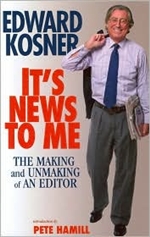New York Confidential: What Gotham publication hasn't Ed Kosner edited?
New York Times, Oct. 1, 2006 Book Reviews It's News to Me: The Making and Unmaking of an Editor, by Edward Kosner. Illustrated. 334 pp. Thunder's Mouth Press. $27.95. Has any New York City newsman visited more stations of the journalistic cross in his career than Edward Kosner? A Manhattan native, Kosner edited the City College student newspaper and worked as a college stringer for The New York Times. In 1958 he joined The New York Post (which was then a liberal paper), where he learned "everything there was to know about raffish, inventive tabloid journalism"--how to ask Nosy Parker questions of cops, politicians and celebrities; how to write entertainingly; and how to edit and rewrite at a gallop. He applied these skills at the two weeklies he went on to edit, Newsweek and New York magazine, as well as at a monthly, Esquire, and finally a daily, The Daily News, which he left in 2003 at the age of 66.
Has any New York City newsman visited more stations of the journalistic cross in his career than Edward Kosner? A Manhattan native, Kosner edited the City College student newspaper and worked as a college stringer for The New York Times. In 1958 he joined The New York Post (which was then a liberal paper), where he learned "everything there was to know about raffish, inventive tabloid journalism"--how to ask Nosy Parker questions of cops, politicians and celebrities; how to write entertainingly; and how to edit and rewrite at a gallop. He applied these skills at the two weeklies he went on to edit, Newsweek and New York magazine, as well as at a monthly, Esquire, and finally a daily, The Daily News, which he left in 2003 at the age of 66.Kosner pours the contents of his abundant life into his memoir, "It's News to Me: The Making and Unmaking of an Editor," and it overflows with boldfaceable names--Katharine Graham, Jerzy Kosinski, Rupert Murdoch, Pete Hamill, Mort Zuckerman, Murray Kempton, Roone Arledge, Nora Ephron, William Paley and Henry Kravis, to name just a few.
Such great success at so many Gotham publications over the last four decades ought to translate into a winning book filled with tales of personal glory, defeats, payback and lessons learned. But Kosner-the-writer delivers a pedestrian account of his life and times that I suspect Kosner-the-editor, at the height of his powers, would have killed or ordered a thorough rewrite of before publication.
To be fair, the life of an editor--even a top New York City editor--does not automatically make a great story. Compared with the reporters they fling into battle, editors lead dull lives--and I write that as a former editor. They sit in their offices, where they assign stories. They push copy around. They go to lunch and to parties, where they trade gossip and insults. They meet with Important People. They hire and fire. But unless an editor possesses the spirit of a buccaneer, like H. L. Mencken or Jim Bellows, his memoirs are more likely to fizzle than to flash.
No buccaneer, Kosner, born in 1937, grew up a ham-eating, third-generation assimilating Jew in Washington Heights. He suffered from near blindness until fitted with glasses after entering school, and describes himself as "gripped by all sorts of phobias and anxieties"--but he was deemed sufficiently smart to skip a couple of early grades. The brightest pupils were accelerated through school, Kosner writes, so "they could get to M.I.T. faster and outthink the Germans" and win World War II.
Although his father had a taste for opera, the Kosner family was decidedly lower-middlebrow, consuming radio entertainment and best-selling novels. Kosner and his friends from "the Washington Heights intelligentsia" escaped this escapism by bus, frequenting the Museum of Modern Art and other fortresses of culture to take in art masterpieces and film retrospectives. An aunt and uncle--"the family cosmopolitans"--introduced him to The New Yorker, The Nation and the world of books, as well as exotic (for Kosner) foods.
This fast-tracked young neurotic--"tiny and brainy, with glasses and braces"--rejected the pricey "third-rate education" offered by New York University for the free "second-rate" one at City College. Taking the 15-minute bus ride down Broadway, he entered college at the age of 16. He felt out of place among the older students until his sophomore year, when he joined the school newspaper. "And then my life truly began," he writes.
As Kosner's life begins in this book, his story starts to fade. Anyone interested in the business of journalism--presumably the book's intended audience--will find his journey and anecdotes fairly generic. He rarely makes enough happen on the page to sustain reader interest. Even his accounts of his luckless reigns at Esquire and The Daily News--obviously painful times filled with betrayal--read like dispassionate notes.
Did Kosner-the-editor inhibit Kosner-the-writer from being more honest about his profession? That's my guess. If only more of "It's News to Me" had been guided by the tabloid sensibility that allows him to describe how he and an uncle tried to kill his terminally ill mother, Annalee, with sleeping pills in 1962:
"Leaning over my mother, I couldn't believe I was actually doing what I was doing, yet I knew it had to be done. But our amateurish efforts failed, and Annalee suffered on for another 48 hours."
Ed Kosner has had it all: success in a competitive business he adores; healthy kids; and real love in his second marriage, to the writer Julie Baumgold. But as any editor can tell you, a book that's mostly about having it all isn't much of a book. This memoir marks one of the rare instances in which Kosner failed to get the story.
